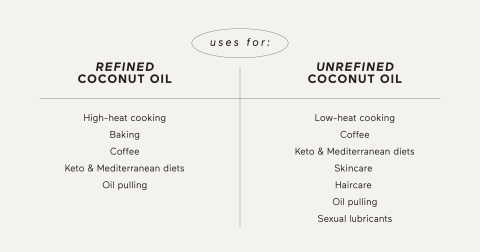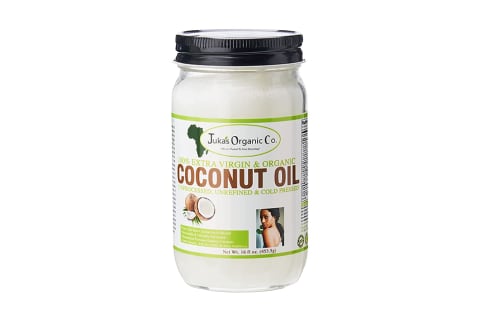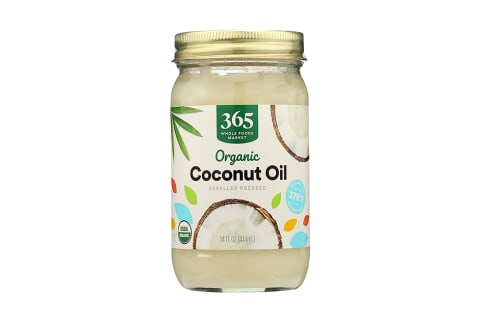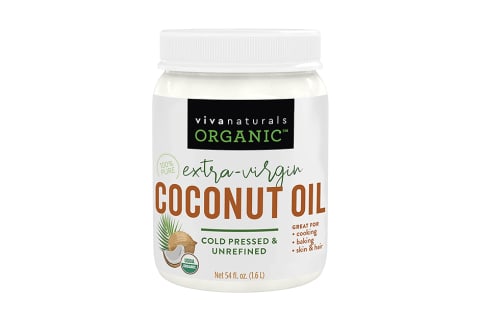Advertisement
Coconut Oil Benefits: 7 Health Perks, Side Effects & How It Compares To Other Oils


Is coconut oil healthy or not? That seems to be the million-dollar question these days. While some express concern over its saturated fat content, others argue that the specialized fatty acids (along with the polyphenols and antioxidants) in coconut oil have a lot to offer.
We asked nutrition experts about the health profile of coconut oil—and they agree that its perks outweigh its risks. Here's what you need to know about the benefits of coconut oil.
What is coconut oil?
Coconut oil is made by pressing coconut meat (fresh or dried) to extract the oil inside. You can find unrefined coconut oil (which has a strong coconut flavor) and refined coconut oil (which goes through more processing and has a more neutral flavor) in most grocery stores.
Benefits of coconut oil
Coconut oil is a 100% plant-based fat. And that fat comes packaged with vitamin E, vitamin K, antioxidants, and polyphenols—all nutrients that have a host of health benefits, according to clinical and culinary dietitian Huma Chaudry, R.D.
Here are some of the top health benefits of consuming coconut oil:
It's a quick source of energy
The MCTs in coconut oil serve as a quick source of energy for your body and your brain. "These little guys are very easy for your body to break down and use for fuel compared to the more common LCT (long-chain triglyceride) fats," functional medicine expert Will Cole, IFMCP, DNM, D.C., previously told mindbodygreen. This is because MCTs skip the liver and get converted quickly into a source of energy by our body.
It's high in healthy fatty acids
The debate around coconut oil stems from its high (82%) content of saturated fats—which may raise LDL (bad) cholesterol1 when consumed in excess, increasing cardiovascular disease risk2.
However, the primary fatty acid in coconut oil (~%50) is lauric acid, a medium-chain triglyceride (MCT), which appears to be less harmful to cholesterol3 due to the way it's quickly metabolized in the body4. Instead of being stored as fat, lauric acid goes directly to the liver to be converted into energy and other metabolites.
The lauric acid in coconut oil has been studied for its antimicrobial and antibacterial effects against Staphylococcus aureus, Streptococcus mutans, Streptococcus pyogenes, Escherichia coli, and Helicobacter pylori5, in particular.
Another fatty acid worth noting is caprylic acid, which accounts for 8% of the fatty acids6 in coconut oil. This fatty acid has been studied for its anti-inflammatory7 and antifungal properties8 when paired with carvacrol in treating candida.
It may promote weight loss
Due to the unique way they are metabolized, MCTs might support weight loss, says integrative dietitian Jessica Cording, R.D. While they don't burn belly fat directly, MCTs can regulate hunger levels and promote satiety9, indirectly promoting weight loss.
Coconut oil is also a high-fat, no-carb staple in the ketogenic diet, which can assist with weight loss and improve metabolic health outcomes10.
It provides a boost for brain health
MCTs also serve as an energy source for your brain, and they may improve memory and overall brain health11. Coconut oil, specifically, may help improve insulin sensitivity12 and help normalize blood pressure13—both risk factors14 for Alzheimer's disease (as well as heart disease and Type 2 diabetes).
There are also a couple of small studies where researchers found that MCTs had positive effects on cognitive abilities15 and semantic memory16 in those with mild to moderate Alzheimer's disease patients. While it's too early to make definitive claims here, it's promising.
It's good for your skin and hair
One thing that we can all agree on: Coconut oil is super hydrating and creamy when applied to the skin.
"Coconut oil is rich in vitamin E, which has been linked to protecting the skin barrier from premature aging and sun damage17," says Chaudry. "While some experts say it may clog pores since it's thicker and can sit on the dermis, this is more of a concern for sensitive or acne-prone skin type."
Keep in mind that unrefined coconut oils retain more of their nutrients (due to their processing), so they're the better bet for skin health.
Coconut oil can also protect hair from damage due to grooming and UV exposure18. Used as a protective agent, coconut oil acts as a barrier as well as replenishes micro-cavities on the surface of the hair19.
It may help control blood sugar—but more research is needed
While there hasn't been much research on coconut oil's effect on blood sugar, one study found that MCTs could increase insulin sensitivity20, thereby minimizing insulin resistance.
It may help protect against chronic diseases when consumed as part of a healthy diet
Recent research21 also shows that coconut oil and its MCTs may help combat a handful of chronic diseases, including cancer22, diabetes23, and Alzheimer's disease24. It also has antioxidant, antimicrobial, and anti-inflammatory properties25 and may help alleviate oxidative stress.
However, it won't work miracles and needs to be consumed as part of an overall healthy diet for best results.
Summary
Refined vs. unrefined
All coconut oil isn't the same, and there are some important distinctions between refined and unrefined coconut oil.
"Unrefined (virgin) coconut oil is basically made from pressing coconut meat. Because it hasn't gone through a lot of processing, you're still getting a strong coconut flavor and smell, so that means when you're cooking with it or using it in recipes you're going to taste it," says Cording.
Refined coconut oil, on the other hand, goes through much more processing. Typically, the coconut meat is dried and then exposed to heat and (in some cases) chemicals that bleach and deodorize it. The result of this energy-intensive process is a more neutral-tasting oil that doesn't have a strong coconut smell or flavor and tends to be more affordable.
Refined coconut oil has a higher smoke point, so it can stand up to higher-heat cooking, but the processing strips some of the phytonutrients and polyphenols26. (Unrefined coconut oil has a smoke point of about 350 degrees, while refined can go up to 450 degrees.)
Clearly, there are pros and cons to both. Here, you can read up on all the differences between refined and unrefined coconut oil (and which one is better for different purposes).

How to use coconut oil
Like most foods, coconut oil is best consumed in moderation as part of a nutrient-dense diet. Here are a few ways to use it:
- Cook and bake with it: The easiest way to incorporate coconut oil into your diet is to use it as a cooking oil. Unrefined coconut oil has a lower smoke point and a sweeter flavor, so it's best to use it for low-heat cooking like baking or roasting. If you're doing any sautéing or stir-frying, you'll want to use refined over unrefined (or use avocado oil, which has a higher smoke point than both), says Cording. Just know that since coconut oil is primarily a saturated fat, it's solid at room temperature and can be trickier to cook with than other types of oils.
- Add it to your coffee: Especially popular with the keto crowd, adding coconut oil to your coffee can help with satiety and keep you full for longer. Chaudry says it can also keep your energy levels more stable without feeling jittery because of the added fats. You can either add a spoon of coconut oil to hot coffee or opt to use pure MCT oil, which has a more neutral flavor.
- Blend it into smoothies: Adding a healthy fat like coconut oil to your smoothie can help keep you full longer and dampen the blood-sugar-raising effect of fruit. It's best to slightly melt it before blending it in.
- Use it as a moisturizer: Coconut oil is an effective all-natural moisturizer for your skin and face. "I have very sensitive skin, and the only two things I use are the mbg body lotion and coconut oil," says Cording. "It's very gentle and moisturizes very well. It's also very hydrating when used topically."
- Swish with it: The science on the ancient Ayurvedic practice of oil pulling is limited, but some studies27 show that it has benefits on oral health and dental hygiene.
Is there a best time of day to eat coconut oil?
Consuming coconut oil at any time of the day can be beneficial, but as Cole previously told mindbodygreen, having it in the morning can help set you up for a more productive day.
Cording adds that adding coconut oil to your breakfast or coffee in the morning may help with portion control throughout the day and provide lasting energy. (Read up on the specific benefits of putting it in your coffee here.)
"Fat helps with the absorption of certain nutrients (fat-soluble vitamins), so if you're someone who takes your vitamins in the morning on an empty stomach, you might be better off having it in the morning with a healthy fat," she says.
However, if you have a sensitive stomach, you may want to eat something before coconut oil. "If someone is using too much oil in general, it may upset the stomach if you have underlying digestive issues. But that's really about how much you're using and not necessarily exclusive to coconut oil," Cording caveats.
Summary
Coconut oil vs. other oils
A handful of studies28 show that the saturated fat in coconut oil affects your biochemistry differently than other types of saturated and unsaturated fats. Here, we compare coconut oil to other popular cooking options:
Coconut oil vs. olive oil:
Olive oil is practically all monounsaturated fats, with a small amount of saturated and polyunsaturated fats. The main fat is oleic acid29, which has been shown to help combat inflammation30 and help with weight management31.
Extra-virgin olive oil (the healthiest kind) has a 350-degree smoke point. Refined coconut oil can go up to 450 degrees, making it better for high-heat cooking.
Olive oil is best for low-heat cooking or drizzling on top of salads or roasted vegetables after they're cooked.
Coconut oil vs. avocado oil:
Like olive oil, avocado oil is mostly monounsaturated fats. The specific breakdown is 71% monounsaturated fats32, 13% polyunsaturated fats, and 16% saturated fats—and much of this in the form of oleic acid.
At 520 degrees, avocado oil has the highest smoke point in the bunch so it's ideal for high-heat cooking. It has a neutral flavor that makes it excellent for baking as well.
Substitutes for coconut oil
- Butter (an ideal baking substitute)
- Avocado oil (the best substitute for roasting or sautéing)
- Olive oil (a good swap for dressings and smoothies)
Side effects and downsides
Coconut oil can be a healthy part of most diets. It's best to be mindful of your portions, though, and make sure you're switching up your healthy cooking oils so you're consuming all different types of beneficial fats. Those who are monitoring their lipids may want to use coconut oil sparingly and discuss it with their doctor.
Gastrointestinal side effects, like diarrhea, cramps, and gastrointestinal discomfort, can happen in those who are consuming too much coconut oil, according to Chaudry. Cutting back on your intake can help mitigate this, as can consuming coconut oil with a meal and not on an empty stomach.
Allergies could also be a concern for someone who has a tree nut allergy, says Cording.
Shopping tips and buying sustainability
Both Chaudry and Cording say that organic, unrefined/virgin coconut oil is typically the healthiest type you can buy. Looking for cold-pressed coconut oil is also a good idea since it wasn't exposed to any heat during processing and, as such, retains most of its nutritional value.
Cording also recommends opting for glass containers over plastic for sustainability reasons. "Not only will you limit plastic consumption, but glass jars are reusable. They make great containers for overnight oats and smoothies when you're on the go," she adds.
Frequently Asked Questions
What are the negatives of coconut oil?
Coconut oil is primarily saturated fat, but as long as you're consuming it in moderation—and rotating it with other oils—this isn't as problematic as once thought. However, when eaten in excess, coconut oil can cause digestive upset, especially to those with a sensitive stomach. It's also solid at room temperature, so it can be a little more difficult to work with than other types of oils.
Is eating a spoonful of coconut oil good for you?
Coconut oil contains beneficial fats, vitamins, and phytonutrients, but you don't necessarily need to eat a spoonful, straight up. You can still get these benefits by adding it to your meals or coffee.
Should I take coconut oil in the morning or at night?
Consuming coconut oil in the morning may help promote satiety and help balance energy levels throughout the day. That being said, there's no real right or wrong way to take it. If you feel satisfied throughout the day and don't need the extra fat in the morning, adding it to your evening meal works too.
The takeaway
Coconut oil has a lot of benefits, from boosting brain health to moisturizing your skin. It's also a versatile pick that can be used in cooking, baking, and as a satiating fat in your morning coffee. While it's still best to take a moderate approach, this tropical fat can absolutely fit into a nutritious diet for most people and it's a healthier choice than many other cooking oils.
32 Sources
- https://pubmed.ncbi.nlm.nih.gov/28166253/
- https://pubmed.ncbi.nlm.nih.gov/35886124/
- https://pubmed.ncbi.nlm.nih.gov/27547436/
- https://link.springer.com/article/10.1007/s11746-014-2562-7
- https://www.ncbi.nlm.nih.gov/pmc/articles/PMC8374439/
- https://www.ncbi.nlm.nih.gov/pmc/articles/PMC5044790/#R10
- https://www.ncbi.nlm.nih.gov/pmc/articles/PMC1573354/
- https://pubmed.ncbi.nlm.nih.gov/31334617/
- https://www.ncbi.nlm.nih.gov/pmc/articles/PMC6683029/
- https://pubmed.ncbi.nlm.nih.gov/32640608/
- https://pubmed.ncbi.nlm.nih.gov/26675661/
- https://pubmed.ncbi.nlm.nih.gov/25911003/
- https://www.ncbi.nlm.nih.gov/pmc/articles/PMC2874191/
- https://pubmed.ncbi.nlm.nih.gov/25997382/
- https://pubmed.ncbi.nlm.nih.gov/31694759/
- https://pubmed.ncbi.nlm.nih.gov/30056419/
- https://www.ncbi.nlm.nih.gov/pmc/articles/PMC3789494/
- https://pubmed.ncbi.nlm.nih.gov/30395784/
- https://www.ncbi.nlm.nih.gov/pmc/articles/PMC7276157/
- https://pubmed.ncbi.nlm.nih.gov/1568535/
- https://pubmed.ncbi.nlm.nih.gov/31928080/
- https://www.frontiersin.org/articles/10.3389/fcell.2020.00651/
- https://pubmed.ncbi.nlm.nih.gov/31869355/
- https://pubmed.ncbi.nlm.nih.gov/35310527/
- https://pubmed.ncbi.nlm.nih.gov/33022082/
- https://www.ncbi.nlm.nih.gov/pmc/articles/PMC8132276/
- https://pubmed.ncbi.nlm.nih.gov/32923724/
- https://pubmed.ncbi.nlm.nih.gov/29511019/
- https://pubmed.ncbi.nlm.nih.gov/19167997/
- https://pubmed.ncbi.nlm.nih.gov/23278117/#:~:text=Olive%20oil%2C%20rich%20in%20oleic,ability%20to%20facilitate%20wound%20healing.
- https://pubmed.ncbi.nlm.nih.gov/32135008/
- https://pubmed.ncbi.nlm.nih.gov/23638933/#:~:text=The%20avocado%20oil%20consists%20of,or%20other%20fruits%20and%20vegetables%2C


